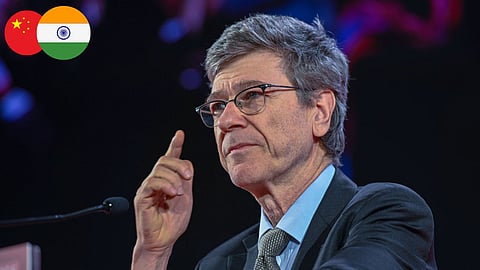

Economist Jeffrey Sachs delivered a clear message to India, while speaking at an event on April 9, —stay away from being a pawn in the growing power tussle between the US and China. He warned that Washington wants to use India as a tool in its broader strategy to contain Beijing, and urged New Delhi to steer its own course in foreign affairs.
“The US wants to use India to beat up China,” Sachs said, adding, “Don’t play the American game… India is too big for a US game.”
Sachs, known for his work in global development and public policy, acknowledged that India and China do have their differences. However, he stressed that it would be in both countries’ best interest to resolve their issues bilaterally—without external interference.
“You’re 40% of the world’s population,” he said, referring to the combined populations of India and China. “You could actually help to run a very decent world together... Don’t be pulled into it.”
According to Sachs, Washington has a long-standing habit of setting countries against each other to protect its own global dominance. He believes India is currently being positioned as a counterweight to China in this larger strategy.
He repeated his point multiple times during his talk: “The US wants to use India, clearly. It wants to use India to beat up China.”
Sachs didn’t hold back in critiquing India’s involvement in international strategic groupings like the Quad—an alliance that includes the US, India, Japan, and Australia. He suggested that such alliances are primarily designed to serve American interests.
“The US loves for India to be in the Quad. It wants India to bash China,” Sachs remarked. He even challenged comments made by some Indian politicians who blamed China for trade tensions. “No, not exactly. It’s actually because of Donald Trump. So, just be careful not to play the game,” he said.
The economist went a step further to suggest that being aligned too closely with the US might come with hidden costs. He described US foreign policy as being rooted in a desire to maintain control—sometimes even at the expense of its allies.
“If you’re a friend of the US, beware! Very dangerous,” Sachs cautioned.
Sachs noted that both India and China have managed to rise economically despite their colonial pasts. India, he said, was one of the largest economies in the world until the British era changed that trajectory.
He speculated that as India continues its economic ascent, it may face resistance from the US, just as China has in recent years. “The US doesn’t want to lose its dominance,” he implied, suggesting that economic power shifts could spark friction.
Despite all the cautioning, Sachs struck a hopeful tone when speaking about India’s future. He predicted that India could overtake the US as the world’s second-largest economy in 10 to 15 years and potentially become the largest by the latter half of the 21st century.
He also pitched for India’s inclusion as a permanent member of the United Nations Security Council.
“How can we have a Security Council without India being a permanent member?” he asked.